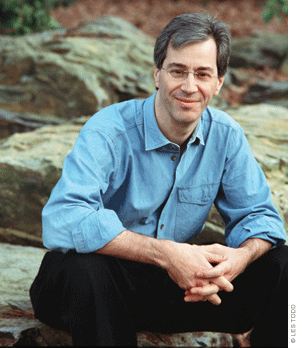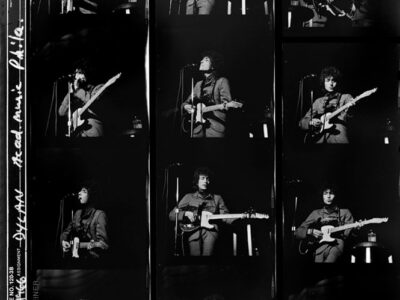
Class of ’77 | Composer Stephen Jaffe C’77 G’78 tends to be pretty low-key—unless, of course, you get him talking about music, at which point the conversation becomes quite animated. A recent evening finds him in his office in Duke University’s Biddle Music Building, enthusing about the student recital he attended the previous weekend. Held at the on-campus coffeehouse, it featured works by graduate composers as well as a set by a deejay.
“It was a phenomenal experience, all these young people getting into some very challenging music and having a great time,” he says. “It almost became a conversation between pieces requiring silence and pieces requiring everyone to participate by dancing, feeling the beat. There were some discussions with some heat, but ultimately a lot of respect both ways. That’s the thing I’m most proud of, the diversity of music I’ve supported.”
Jaffe’s polyglot approach has helped make him one of the nation’s most respected composers. While he has awards and fellowships from the Guggenheim Foundation, Kennedy Center, and National Endowment for the Arts to his credit, his biggest coup came this year when he was elected to the American Academy of Arts and Letters. Induction into the 250-person Academy is one of the highest honors in American culture, and it’s for life.
“I’m reminded of Groucho Marx’s famous quote about being suspicious of any club that would admit him as a member,” Jaffe says. “Everybody who gets in has the feeling of, ‘Why me? It should’ve been so and so.’ But the biggest reason it’s so meaningful to me is that it means somebody’s been listening. Not just to my latest piece, but over all these years. That means a lot to me, to any composer.”
Jaffe decided he was going to be a composer at age 12. When he moved with his family to Switzerland as a teenager, he found himself sufficiently near Geneva’s Conservatory of Music that he was able to hear much of the leading European avant-garde music of the time. By the time he returned to the States for college, walls were coming down in classical music as composers began drawing from other arts and even nature for influences and sounds.
He came to Penn because its faculty boasted three of 20th-century American music’s foremost composers—the late George Rochberg G’49; Richard Wernick, the Magnin Professor Emeritus of Music; and especially George Crumb Hon’09, the Walter Annenberg Professor Emeritus in the Humanities and a fellow member of the Academy (as was Rochberg).
“I learned a lot from Crumb through osmosis,” Jaffe says. “Just hearing him play. The music just goes through him like a bolt of lightning. ‘Oh, you don’t know Chopin’s “Etude in E-Flat Minor?”’ He’d play it, and if I had heard it before, I’d never heard it like that. He also had the power of learning from earlier music without sounding like it. He somehow knew how to appropriate and generalize music for reuse, without just copying it.”
Jaffe has charted a similarly idiosyncratic course, crafting a distinctive body of contemporary classical music for everything from string quartets to full orchestras. Some of his better-known pieces include 2001’s “Homage to the Breath,” a musically poetic evocation of the different manifestations of breathing (at a breathlessly paced tempo, ironically enough); and 2004’s “Cut Time,” an uptempo, gospel-influenced piece Jaffe composed for the National Symphony Orchestra.
“Stephen works in an idiom that most members of the general public would find challenging, but without being too esoteric or obscure,” says composer and fellow Academy member John Harbison. “His work ranges far and wide in terms of how much he includes by way of melody and harmony. It’s not music you can predict until you hear it.”
In 1980 Jaffe joined the faculty at Duke, where he is the Semans Professor of Music Composition. He has spent the past three decades teaching, composing, and struggling to find enough time for both.
“Some pieces are volunteers that spring up from the compost heap; others take more time to bring out,” he says about composing. “It seems to require a lot of time by myself. I’ve learned to write music that essentially goes from the heart right through to the pencil. I hear it inside. I love sitting there and hearing all the voices and the timbres, imagining the space and the impact. But the truth is, I can’t remember how the hell I do it most of the time. People will ask, ‘What did you have in mind when you did that? Tell us about that piece.’ And sometimes I can’t because I’ve forgotten.”
In a sense, his election to the Academy represents a closing of the circle for Jaffe, who launched his recording career with its assistance two decades ago. A $15,000 grant in 1993 underwrote his first album for Bridge Records, Music of Stephen Jaffe. The aforementioned “Cut Time” and “Homage to the Breath” both appear on 2008’s Music of Stephen Jaffe, Vol. 3, and a fourth volume is in the works.
Now, as a member of the Academy, Jaffe will have a say in deciding which upcoming artists get grants like that to help them get started. He has a refreshingly unstuffy outlook on music that is and isn’t worthy of attention and support.
“I’ve heard a lot of people from the Academy talking about how somebody was ‘looking for the necessary,’” Jaffe says. “That’s a good phrase. In some music ‘the necessary’ is selling a lot of copies of a three-minute song. That’s great—you’ll not catch me trashing any music. But you are gonna catch me deciding what I put in my body. My father’s a cranky old man, and when waitresses ask what he wants in his coffee, he’ll say, ‘Coffee.’ That’s the way I feel about music.”
—David Menconi




